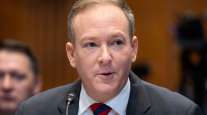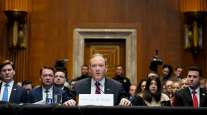Senior Reporter
Trucking Trade Groups Oppose EPA Phase 3 Rule

[Stay on top of transportation news: Get TTNews in your inbox.]
The Environmental Protection Agency’s Phase 3 emissions final rule has been met with widespread opposition by key players in the trucking industry.
The final rule, announced March 29, requires a range of electric vehicle or other nontraditional sales, depending on the type of vehicle and use. For example, 30% of “heavy-heavy-duty vocational” trucks would need to be zero-emission by 2032, EPA said, while 40% of shorthaul day cabs would need to be zero-emission battery-electric or hydrogen vehicles.
EPA said it received extensive feedback on last year’s proposed rule, including more than 175,000 public comments, testimony at public hearings and engagement with stakeholder groups.
“The final standards were informed by the best available data and information in the public record and rigorous technical assessments, including consideration of the extensive public input EPA received in response to the proposed rulemaking,” EPA said in a statement.
Trucking groups question that depiction of the final rule.
We oppose the emission standards for heavy-duty trucks announced today by EPA. The post-2030 targets remain entirely unachievable given the current state of zero-emission technology, the lack of charging infrastructure & restrictions on the power grid. https://t.co/zrurFsygD8 — American Trucking (@TRUCKINGdotORG) March 29, 2024
American Trucking Associations said the new Phase 3 rule for heavy-duty trucks will create “unachievable targets and will carry real consequences for the U.S. supply chain and movement of freight throughout the economy.”
“ATA opposes this rule in its current form because the post-2030 targets remain entirely unachievable given the current state of zero-emission technology, the lack of charging infrastructure and restrictions on the power grid,” ATA President Chris Spear said. “Given the wide range of operations required of our industry to keep the economy running, a successful emission regulation must be technology neutral and cannot be one-size-fits-all. Any regulation that fails to account for the operational realities of trucking will set the industry and America’s supply chain up for failure.”
While EPA’s final rule includes lower zero-emission vehicle rates for model years 2027-29, ATA says forced zero-emission vehicle penetration rates in the later years will drive only battery-electric and hydrogen investment, “limiting fleets’ choices with early-stage technology that is still unproven.”
Any regulation that fails to account for the operational realities of trucking will set the industry and America’s supply chain up for failure.
Chris Spear, president of American Trucking Associations
Image
In a statement, the Truck and Engine Manufacturers Association said it has a long and successful history of implementing previous EPA emission regulations but that it opposes this rule.
“We are concerned that the final rule will end up being the most challenging, costly and potentially disruptive heavy-duty emissions rule in history,” EMA said. “Previous rules included stringent emission standards that required manufacturers to comply by developing and implementing advanced technologies to improve engine and vehicle performance. The new GHG Phase 3 rule will require manufacturers to sell a set percentage of zero-emission vehicles, which is beyond their own ability to control.”
The Clean Freight Coalition said in a statement: “Rather than mandating a new technology that carries with it exorbitant costs and operational concerns, policymakers should support lower-carbon alternatives to diesel fuel that are currently commercially viable (such as biodiesel and renewable diesel).
“These lower-carbon fuels will allow EPA to make progress on emissions today, while the industry implements longer-term options. Mandating a transition to technology that is decades away from being viable at scale will keep older, less environmentally friendly commercial vehicles on the road longer, stunting the carbon reduction progress EPA seeks.”

“American Truck Dealers is opposed to EPA’s final Phase 3 GHG rule because it will have unprecedented negative impacts on American commercial trucking, large swaths of U.S. businesses, customers and consumers, and likely overall emissions and the environment,” it said. “The Phase 3 rule will only exacerbate this problem by further forcing commercial vehicle customers to hold on to existing fleets or purchase used trucks. Having older trucks remain on the road does nothing to save fuel, make our roads safer or reduce GHG emissions.”
In a statement, Truckload Carriers Association President Jim Ward said the Phase 3 rule “calls for the strictest-ever limits on greenhouse gas emissions from heavy-duty trucks.”

“It’s important to recognize the progress that’s been made by our many TCA members who have tested equipment, trained both technicians and professional drivers, while incurring additional costs along the way to complying with EPA regulations instituted over the past couple of decades,” Ward said. “The industry has effectively reduced NOx and particulate matters through the evolution and implementation of new technologies and remains committed to being a good steward of the environment. We cannot just sit idly by and watch the implementation of a policy that will have a significant impact on our members business.”
Owner-Operator Independent Drivers Association President Todd Spencer said, “Small business truckers happen to care about clean air for themselves and their kids as much as anyone. Yet this administration seems dead set on regulating every local mom and pop business out of existence with its flurry of unworkable environmental mandates.”
Want more news? Listen to today's daily briefing below or go here for more info:





